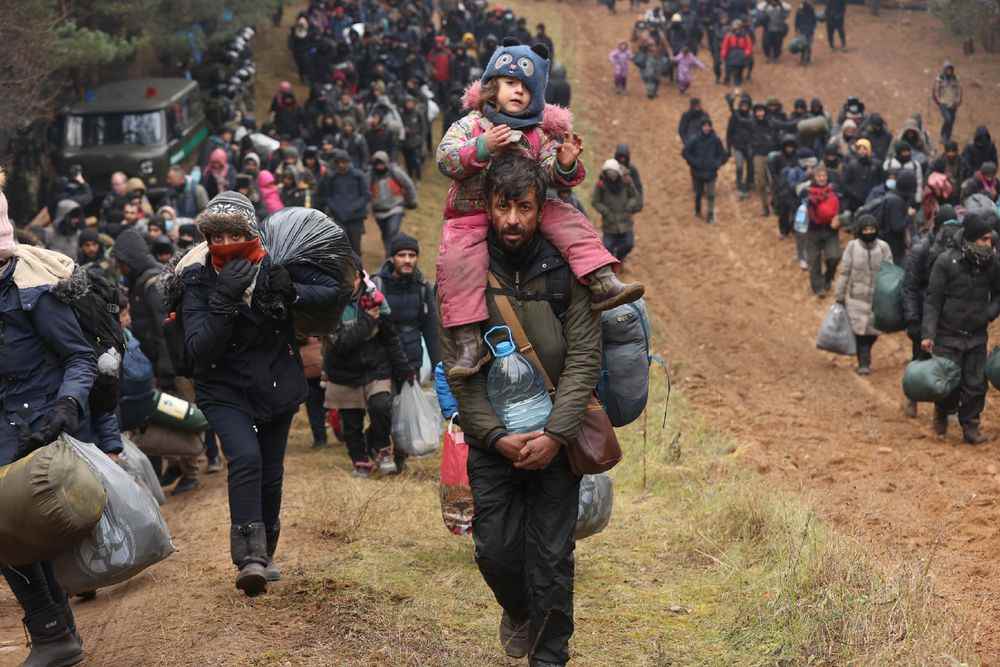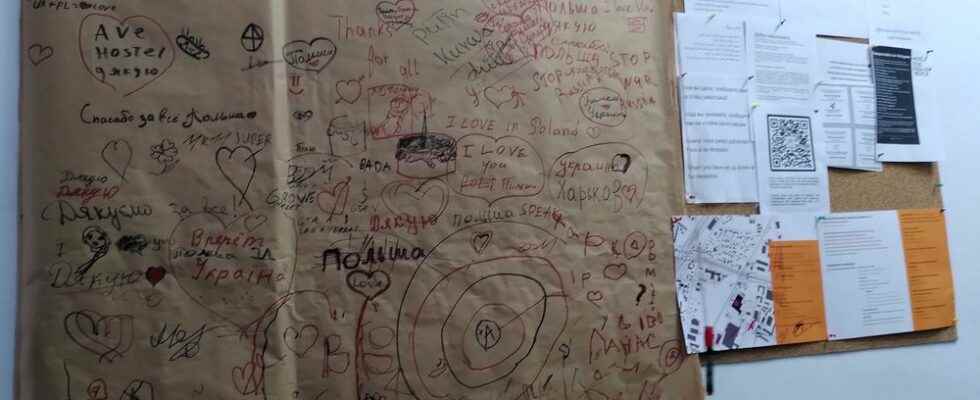To avoid malicious acts, the address is kept secret. We can just say that it is in the suburbs of Warsaw, in a commercial area. Here, the Club of the Catholic Intelligentsia (KIK), a Polish NGO, welcomes about sixty refugees from Ukraine, in a hotel kindly provided by its owner, with clean rooms each containing four beds. In the entrance hall, a large panel is covered with messages mixing hearts, thanks and calls to stop the war, in different languages. And for good reason: it is one of the few places in Poland that welcomes “non-Ukrainians”.
At a time of war in Ukraine, refugees are not all entitled to the same treatment. The generosity of the Poles has made it possible to absorb more than 3 million people since the outbreak of hostilities by Vladimir Putin on February 24. However, a fraction of the refugees recently arrived in Poland, victims of discrimination, do not benefit from it – other Member States of the European Union also establish this type of distinction.
Words of thanks were left by the non-Ukrainian refugees hosted in the hotel run by the Catholic Intelligentsia Club.
The Express
Foreign residents in Ukraine who have fled to Poland cannot claim certain provisions of the law recently passed by the ultra-conservative government of the Law and Justice party (PiS). No financial assistance is therefore provided for individuals who propose to take in these refugees, whereas compensation can be obtained when it comes to holders of Ukrainian passports. Originally from Turkmenistan, Martan, who has been studying geography in kyiv for three years, found the only solution to be the structure administered by the KIK, after having “spent two weeks in a transit center where the beds of camp”.
At the hotel, these separate refugees find hot meals and are referred to NGOs likely to help them continue to the West or carry out various administrative procedures. “In principle, they can only stay three days, time to rest and think about the next step, but we are not kicking anyone out,” argues Maria Ossolinska, the hotel manager. Some, like Lilian, have been here for several weeks. “I am continuing my medical courses online at the University of kyiv, where I hope to return as soon as possible, I only have three semesters left to obtain my diploma”, explains this 31-year-old Nigerian. She confides that she is still traumatized by her journey to Poland: “I was the victim of racism, in particular I was forced to give up my place on the train, it was horrible.”
Stigmatized Ukrainian Roma
This discrimination is also the lot of the 70,000 Ukrainian Roma who fled to Poland. “Many had problems with Ukrainian border guards who told them ‘Ukrainians first and minorities later’,” says Joanna Talewicz-Kwiatkowska, an anthropologist at the University of Warsaw and president of an association making their voices heard. voice, Towards Dialogue. And they are entitled to less consideration than other Ukrainians in Poland. We have faced many situations where shelters and some owners have refused to accommodate them, sometimes at the last moment.”
The activist deplores the lack of support from the Polish government: “They claim that the welcome is good for all refugees from Ukraine, and refuse to recognize that the Roma need specific help.” Proof of the persistence of stereotypes against gypsy populations, the Polish president, at the end of February, had fun in a tweet from a Russian tank allegedly stolen by Ukrainian Roma. “They are fighting like other Ukrainians, this message is shocking and shows how the Roma are discredited”, indignant Joanna Talewicz-Kwiatkowska.
Belarus border hell
Welcoming on its Ukrainian border, Poland is intractable on that shared with Belarus, an area prohibited since September to humanitarian organizations and journalists. As one recalled recent chilling report by Amnesty Internationalthe border guards are carrying out pushbacks of migrants accused of playing into Moscow’s hands – this flow, it is true, was knowingly organized by the Belarusian dictator Alexander Lukashenko to destabilize the European Union.
“Pushed back on both sides, dozens find themselves stranded in the forest, including women, children, seniors, sometimes sick, while the temperature there is often negative, denounces the lawyer Marta Gorczynska, who intervenes on place. Contrary to what the authorities claim, they are refused to be able to file an asylum application. Yet they too, originating from Syria, Afghanistan or Yemen, are fleeing armed conflicts.”

Migrants at the border between Belarus and Poland, near the Polish border crossing of Kuznica, November 15, 2021.
afp.com/Oksana MANCHUK
At this forgotten border of nearly 400 km, the army erects a barrier of barbed wire. “This will not prevent passage, because the marshy areas will remain without walls, points out Maciej Nowicki, president of the Helsinki Foundation for Human Rights. These refoulements, illegal, shocking, are nonsense.” For these migrants, however, Poland is only a transit country: Berlin estimates that 13,000 migrants crossing the Polish-Belarusian border have applied for asylum in Germany.
Despite threats of legal action, Poles try to bring meals to refugees stranded at the border and, sometimes, to lead them to safe places before heading west. Exhausted, lost, about twenty have already been found dead in the woods. They could be a hundred, according to NGOs, counting the missing.

–>
our special correspondent in Warsaw, Clément Daniez
